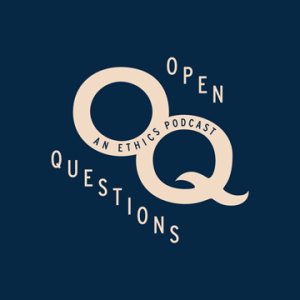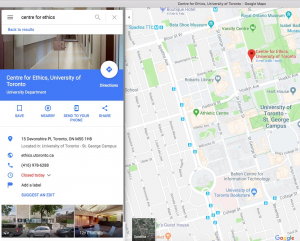We’re looking for one or two energetic, enterprising, enthusiastic work-study students for the summer. Please apply via the Career Learning Network (CLN) and search for the Centre for Ethics job in the keyword/job title section “Research Assistant” (Job ID 117595).
Category Archives: News
😎 Just Posted: Call for C4E Doctoral Fellowship (Due May 1, 2018)
Centre for Ethics
C4E Doctoral Fellowship
2018-19
We invite applications for the C4E Doctoral Fellows Program at the Centre for Ethics, University of Toronto, during the 2018-19 academic year.
We expect to award one or two fellowships to outstanding doctoral students at the University of Toronto. We welcome candidates with research interests from diverse backgrounds including, but not limited to, philosophy, law, political science, the social sciences, the humanities, computer science, engineering, and technology studies, that align with the C4E’s mission as an interdisciplinary centre aimed at advancing research and teaching in the field of ethics, broadly defined, by bringing together the theoretical and practical knowledge of diverse scholars, students, public servants and social leaders in order to increase understanding of the ethical dimensions of individual, social, and political life. To get a sense of the wide disciplinary range and diversity of C4E events, activities, and projects, please consult the C4E website (https://ethics.utoronto.ca).
The C4E Doctoral Fellows Program is open to doctoral students enrolled in the Faculty of Arts and Science, the Faculty of Law, the Faculty of Management, the Faculty of Medicine, or the Faculty of Education (OISE/UT) at the University of Toronto. Applicants should have completed their course requirements and have received formal approval of their doctoral dissertation proposals.
C4E Doctoral Fellows receive a stipend of $2,000 for the academic year. Fellows will have office space at the Centre for Ethics, with access to a printer and photocopying facilities. Doctoral Fellows are expected, throughout the term of their fellowship, to be in residence at the Centre for Ethics and to actively participate in the Centre’s intellectual life by attending and working closely with the director in planning Centre events. Fellowships are non-renewable.
Candidates should submit the following materials:
- Graduate transcript;
- Dissertation proposal;
- Curriculum vitae;
- A scholarly paper or dissertation chapter, written in the last year; and
- A letter of reference from the dissertation supervisor.
Please send complete applications to Markus Dubber, Director, Centre for Ethics, c/o director.ethics@utoronto.ca.
Applications open: April 1, 2018
Applications due: May 1, 2018
👁 Just Posted: Call for C4E Postdoctoral Fellowship in Ethics (Due April 15, 2018)
Postdoctoral Fellowship in Ethics, Centre for Ethics, University of Toronto
Applications are invited for a postdoctoral fellowship to be held at the Centre for Ethics, University of Toronto (C4E), during the 2018-19 academic year. We welcome candidates with research interests from diverse backgrounds including, but not limited to, philosophy, law, political science, the social sciences, the humanities, computer science, engineering, and technology studies, that further the C4E’s mission as an interdisciplinary centre aimed at advancing research and teaching in the field of ethics, broadly defined, by bringing together the theoretical and practical knowledge of diverse scholars, students, public servants and social leaders in order to increase understanding of the ethical dimensions of individual, social, and political life. To get a sense of the wide disciplinary range and diversity of C4E events, activities, and projects, please consult the C4E website (https://ethics.utoronto.ca).
Under the direction of the Director, Centre for Ethics, the successful candidate will conduct ethics-related research and help to develop an interdisciplinary ethics community across campus and to foster public discourse on issues of ethical import in all aspects of individual, social, and political life, by facilitating and participating in C4E events, activities, and projects. The successful candidate will also be expected to teach one single-semester course in each of the fall and winter terms.
The appointment term is from August 1, 2018 to July 31, 2019, at a combined research and teaching stipend of $51,000 per year.
Applicants must have completed all requirements for their doctorate by July 31, 2018. Candidates must also be no more than 5 years from the awarding of their degree, and cannot have accepted or hold a tenure-track position.
To apply, please send a cover letter of application, a current CV, and a sample of written work to ethics@utoronto.ca. Applicants also should arrange to have three confidential letters of reference sent directly to the same email address; at least one of the reference letters should speak to the applicant’s teaching experience and ability.
Complete applications received by April 15, 2018 will be given priority; however, the position will remain open until filled. Any additional inquiries may be addressed to the Centre Administrator at ethics@utoronto.ca.
Employment as a Postdoctoral Fellow at the University of Toronto is covered by the terms of the CUPE 3902 Unit 5 Collective Agreement. Teaching will be covered by the terms of the CUPE 3902 Unit 1 Collective Agreement. This job is posted in accordance with the CUPE 3902 Unit 5 Collective Agreement.
The University of Toronto is strongly committed to diversity within its community and especially welcomes applications from racialized persons / persons of colour, women, Indigenous / Aboriginal People of North America, persons with disabilities, LGBTQ persons, and others who may contribute to the further diversification of ideas.
Date of posting: March 1, 2018
Deadline: April 15, 2018
C4E Is on the Map!
Image
C4E in the News: Urban Experts Tackle Toronto’s Most Pressing Ethical Issues at U of T Event Series
Urban experts tackle Toronto’s most pressing ethical issues at U of T event series
When it comes to ethics, “everyone is an expert and no one is an expert,” says Markus Dubber, a professor in the Faculty of Law and director of the Centre for Ethics at the University of Toronto.
That’s what makes his approach to the centre so distinctive. He’s less interested in hearing from people who study ethics for a living, opting instead to get people to think about the ethical dilemmas in their own fields of expertise.
“You want people to think about the ethics of what they’re doing,” he says. read more
Posted: Call for C4E Visiting Faculty Fellow Applications (Due March 1, 2018)
The Centre for Ethics at the University of Toronto, an interdisciplinary centre aimed at advancing research and teaching in the field of ethics, broadly defined, welcomes applications from faculty at other universities and research institutes, regardless of discipline or field of study, who wish to spend the academic year as a Visiting Professor to conduct research related to the Centre’s mission “to bring together the theoretical and practical knowledge of diverse scholars, students, public servants and social leaders in order to increase understanding of the ethical dimensions of individual, social, and political life.”
All research projects related to the Centre’s mission are welcome; please consult the Centre’s website to get a sense of the variety and scope of current projects and initiatives.
The Centre provides Visiting Professors with office space, a computer, library privileges, and access to the university’s electronic resources. (NB: It does not provide salary replacement or administrative support.) Visiting Professors contribute to the Centre’s intellectual life through active participation in seminars, workshops and other Centre events. For information on the Centre’s facilities, located in the heart of the University of Toronto’s downtown (St. George) campus, please consult the Centre’s website.
Applications for yearlong stays are preferred. Other applications should specify the period of the proposed visit, e.g., summer (May-August), fall (September-December) or spring term (January-April). To apply, please send a cover letter, statement of proposed research, and CV to ethics@utoronto.ca. Please note that these visiting positions are intended for individuals holding full-time faculty positions at universities and research institutes who are on leave and intend to return to their permanent position at the end of their stay at the Centre for Ethics.
Applications are considered throughout the year; to ensure full consideration for the 2018-19 academic year, please submit your application by March 1, 2018.
OPEN QUESTIONS Podcast: New Episode on Money, Love, and Kidneys
 Why can’t money buy love? Should we be able to buy and sell kidneys? And is money really that valuable if we don’t have enough free time to spend it? In this episode we speak to David Dick (University of Calgary), Andrew Flescher (Stony Brook University), and Julie Rose (Dartmouth College).
Why can’t money buy love? Should we be able to buy and sell kidneys? And is money really that valuable if we don’t have enough free time to spend it? In this episode we speak to David Dick (University of Calgary), Andrew Flescher (Stony Brook University), and Julie Rose (Dartmouth College).
Open Questions is a production of the Centre for Ethics at the University of Toronto. The music is written and performed by Markku Wainman.
Check out the new episode from Open Questions: An Ethics Podcast @UofTEthics hosted by Jeremy Davis & Eric Mathison, available on SoundCloud, Stitcher, and iTunes.
C4E in the News: Listening in the Grey Zone (by Robin Roger)
OPEN QUESTIONS: New Episode on Cultural Heritage
 What makes cultural heritage worth protecting? Why are some practices valuable while others aren’t?
What makes cultural heritage worth protecting? Why are some practices valuable while others aren’t?
Check out the new episode from Open Questions: An Ethics Podcast @UofTEthics hosted by Jeremy Davis & Eric Mathison, available on SoundCloud, Stitcher, and iTunes.
Call for Papers: Globalization and its Critics in the 21st Century
The Graduate Associates at U of T’s Centre for Ethics are soliciting papers for their 6th annual graduate student conference, the theme of which is “Globalization and its Critics in the 21st Century.” We will use this opportunity to examine the categories and concepts that different disciplines have used to understand, defend, or critique globalization and its critics. We hope to interrogate the usefulness and ethical implications of these frameworks for thinking about contemporary developments. How have different disciplines conceptualized globalization? How have recent social and political changes and movements affected the way we talk and think about globalization? What are the ethical dimensions of these changes? What are the ethical and theoretical stakes of the study of globalization in the 21st century, both within and beyond the university?
The Graduate Associates invite participants to present their work in an interdisciplinary environment that takes a deliberately broad approach to ethics. We welcome submissions from a variety of fields, including, but not limited to, political theory, political science, philosophy, literature, law, sociology, economics, religious studies, and history. This two-day event will invite faculty discussants to participate and comment on presenters’ work; it will also feature a public keynote address by Professor Bernard Yack, author of Nationalism and the Moral Psychology of Community.
Possible topics include, but are not limited to:
- Nationalism, Populism, and the New Right
- The Global vs. the Local in the History of Political, Philosophic, and Religious thought
- Cosmopolitanism
- Economic Globalization
- Global/World Literatures
- Anti-Globalization Movements and Rhetoric
- Globalization in/and the Media
- Quantitative Studies of Globalization
- Colonialism and Postcolonialism
- Globalization and the Post-secular
Deadline for Submissions: January 15, 2018
Interested participants should send an abstract of their paper, not exceeding 300 words, to graduateassociates@gmail.com with the subject line ‘Graduate Conference Proposal 2018’. Submissions must be prepared for blind review. In your email, please include your name, abstract title, and institutional affiliation. We can only accept one submission per author. Presentations should take the form of 15-20 minute conference-style papers. Some travel funds may be available (amount and availability TBD). Successful applicants will be contacted by February 1, 2018.
For more information, please contact us at graduateassociates@gmail.com or visit our web page.
OPEN QUESTIONS Podcast in the News!
Ethics of Food panel draws a crowd!
Gallery

This gallery contains 4 photos.
On Monday, November 20, 2017, a lively interdisciplinary panel, featuring Tammara Soma (Food Systems Lab), Matthew Feinberg (Rotman School of Management), and Stephen Scharper (School of the Environment & Anthropology) discussed food choices, production, consumption, and disposal, highlighting the complexity of the issues … Continue reading


